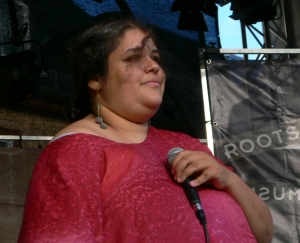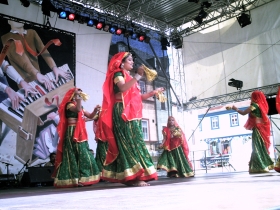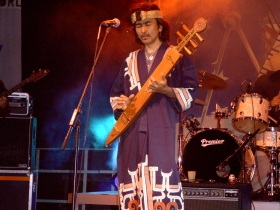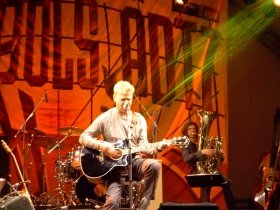Reflections on the 2007 Tanz&FolkFest Rudolstadt
23. 7. 2007 | Rubriky: Articles,Live reviews
Rudolstadt, Germany, 6-8 July 2007
[by Ken Hunt, London] As far as Germany is concerned, the sovereignty of TFF Rudolstadt must now be taken more or less as a given. It is a model of how to revitalise a local economy too. The 2007 festival reasserted such contentions many times over. Like nearly every festival I’ve ever attended, the knack lay in out-balancing longueurs with high points. That said, this year TFF RU unwound a new strand of adventurousness with part of its US-themed programming. Philip Glass’ setting of Allen Ginsberg’s poetry, Hydrogen Jukebox (in a performance from Ensemble Creativ), the Degenerate Art Ensemble and, most notably, Laurie Anderson raised the bar in that respect.
 Over its life the festival has gone from the socialist showcase and display of left-leaning solidarity of its beginnings in 1955 to a festival that has grown and grown since going ‘free-world’ (reader, add emoticon of choice) in 1991. It has grown into something that would have overwhelmed the minds of the town’s population in its pioneering GDR socialist days. The mind-boggling array on offer was more than enough to do any full-time professional music journalist’s head in, let alone a local burgher with a resident’s discount ticket.
Over its life the festival has gone from the socialist showcase and display of left-leaning solidarity of its beginnings in 1955 to a festival that has grown and grown since going ‘free-world’ (reader, add emoticon of choice) in 1991. It has grown into something that would have overwhelmed the minds of the town’s population in its pioneering GDR socialist days. The mind-boggling array on offer was more than enough to do any full-time professional music journalist’s head in, let alone a local burgher with a resident’s discount ticket.
One long-established feature of the festival, organisationally speaking, is its series of Schwerpünkte or major themes. Over the years, three have survived – a nation, an instrument and a dance. This year had the United States as the country; keyboards the so-called ‘Magic Instrument’; and polonaise the dance. There was also a sidelong dive into the world of Sufism on the 400th anniversary of the birth of the poet-philosopher known variously as Jelaluddin Balkhi or Rumi (1207-1273). Those names variously reveal his birthplace in Balkh in modern-day Afghanistan and his family finding sanctuary and resettling in Konya in modern-day Turkey. Parenthetically, Rumi translates as ‘from Roman Anatolia’ according to Coleman Barks and John Moyne’s The Essential Rumi (1997). And then, of course, there was the music and dance that had nothing to do with any of those river-like themes. There is still a massive dance contingency for whom the non-dance acts count as secondary. And vice versa.
Before going any further, these reflections are necessarily subjective. The sheer scale and geography of the festival mean any one festival-goer can only skim the surface of what was on offer on the 24 outdoor and indoor venues. Next, I have to declare an interest, as they say (cynics say theoretically) in UK parliamentary terminology. I act as editor of the English content in the hefty programme. Furthermore, a chunk of my time and energy this year was taken up with a talk with Laurie Anderson. The rather unfolky and somewhat clunkily titled talk Laurie Anderson. Allen Ginsberg. Philip Glass. Sketches of American Counterculture was turned from ‘talk’ into a natter in minutes with tales of sex and drugs and William Burroughs, exchanged memories of Allen Ginsberg and artistic derring-do about her work in all its multimedia variety.
 Given this website’s Czech roots, it was fitting that Ridina Ahmedová was the first music that I experienced at the festival. She was the opening act on the Konzertzelt (concert tent) stage in the Heinepark. One of three venues in Heine’s pet park, now you ask. Jo Meyer was acting as the stage’s Moderator (master of ceremonies; compere would be so vulgarly televisual). Finding the original live wire of German dance bands from JAMS to Polkaholix acting as the stage’s master of ceremonies occasioned a double take. Imagine seeing Britain’s Jo Freya or Belgium’s Wim Claeys doing that job instead of playing or calling the dance.
Given this website’s Czech roots, it was fitting that Ridina Ahmedová was the first music that I experienced at the festival. She was the opening act on the Konzertzelt (concert tent) stage in the Heinepark. One of three venues in Heine’s pet park, now you ask. Jo Meyer was acting as the stage’s Moderator (master of ceremonies; compere would be so vulgarly televisual). Finding the original live wire of German dance bands from JAMS to Polkaholix acting as the stage’s master of ceremonies occasioned a double take. Imagine seeing Britain’s Jo Freya or Belgium’s Wim Claeys doing that job instead of playing or calling the dance.
As Ridina Ahmedová’s name indicates, her cultural bloodlines and lineage are mixed, with a Sudanese father and a Czech mother (with a Russian and Jewish gene pool). Nothing, certainly nothing on her solo album hlasem (by voice), quite prepares you for witnessing her singing first-hand even if it slots all the components into place. The reality, however, trounced all expectations. Guaranteed. And here’s why. First you see her recording a melodic fragment or a cadence-in-melody live. Played back through some electronic gubbins, it becomes a looped phrase against which she sings live. Before your eyes, so to speak. If that sounds complex, the reality isn’t. The art lies in turning theory into practice. Second takes clearly weren’t part of her act, but there again neither was the 20.47 train going by or sound leaking from the nearby dance stage. As the full measure of what she was doing became clear, it was like peeling away layers of incredulity. Her take on Mongo Santamaria’s Afro-Blue may have been familiar melodically via John Coltrane (or even the Albion Band circa 1978 and Rise Up Like The Sun) but sung countermelody live it took on a different dimension. Her voice is strong and flexible, in Czech terms like a youthful Ida Kelarová because of her power and expressiveness, though quite different stylistically. The comparison is high praise. Leading me to say unequivocally: Ridina Ahmedová is in a league of her own.

 Music and dance are bound to waylay you at this festival. You sit unwinding or waiting for friends to turn up and before you know it a catch of melody from a nearby stage will turn your head. Like the Polish band Que Pasa pumping out good old-fashioned dance tunes on the Theaterplatz stage after the Laurie Anderson talk. Everything is hustle and bustle. Someone you expect to see again or run into, you never meet or see for the entire festival. Musical revelations come casually. Like, say, with the Oki Dub Ainu Band on the Burgterrasse (castle terrace) on Friday evening. Less so with the Gujarati dance ensemble Shilpagya and their Bollywood-into-folk or mock-folk themes on the main Markt (marketplace) stage, however. Or not quite as planned in the case of Charlie Mariano. Or Ali Reza Ghorbani. The Boston, Massachusetts-born saxophonist and one of the most important East-West crossover musicians of our era, that would be that Mariano fellow, was in such demand that the church doors were shut. Scores of people sat listening to his South Indian set with vocalist R.A. Ramamani, mridangam (barrel-drum) player T.A.S. Mani and multi-percussionist Ramesh Shotham on the grass outside – we English know the true meaning of lawn (Rasen) – basking in the Saturday afternoon sunshine. Twice over, an outside broadcast – thanks to a German radio broadcast. Ali Reza Ghorbani on the other hand started late and, adopting a Peter Cook whiny voice, the clock is a harsh mistress. When it came to the Seattle-based Degenerate Art Ensemble in the castle courtyard of the Heidecksburg on Friday night, having got waylaid meant missing the bulk of their only show. With lead singer Haruko Nishimura looking like a Björk understudy in a hoop dress (speaks a truant from sartorial elegance and know-how), DAE sounded like a cross between the Art Bears and fun. If you get my drift.
Music and dance are bound to waylay you at this festival. You sit unwinding or waiting for friends to turn up and before you know it a catch of melody from a nearby stage will turn your head. Like the Polish band Que Pasa pumping out good old-fashioned dance tunes on the Theaterplatz stage after the Laurie Anderson talk. Everything is hustle and bustle. Someone you expect to see again or run into, you never meet or see for the entire festival. Musical revelations come casually. Like, say, with the Oki Dub Ainu Band on the Burgterrasse (castle terrace) on Friday evening. Less so with the Gujarati dance ensemble Shilpagya and their Bollywood-into-folk or mock-folk themes on the main Markt (marketplace) stage, however. Or not quite as planned in the case of Charlie Mariano. Or Ali Reza Ghorbani. The Boston, Massachusetts-born saxophonist and one of the most important East-West crossover musicians of our era, that would be that Mariano fellow, was in such demand that the church doors were shut. Scores of people sat listening to his South Indian set with vocalist R.A. Ramamani, mridangam (barrel-drum) player T.A.S. Mani and multi-percussionist Ramesh Shotham on the grass outside – we English know the true meaning of lawn (Rasen) – basking in the Saturday afternoon sunshine. Twice over, an outside broadcast – thanks to a German radio broadcast. Ali Reza Ghorbani on the other hand started late and, adopting a Peter Cook whiny voice, the clock is a harsh mistress. When it came to the Seattle-based Degenerate Art Ensemble in the castle courtyard of the Heidecksburg on Friday night, having got waylaid meant missing the bulk of their only show. With lead singer Haruko Nishimura looking like a Björk understudy in a hoop dress (speaks a truant from sartorial elegance and know-how), DAE sounded like a cross between the Art Bears and fun. If you get my drift.
 Saturday night was RUTH night for me. RUTH is pronounced like ‘Root’ and the annual RUTH awards are a deliberate pun on ‘roots’ and all that. Awards went to Charlie Mariano, the non-singing, non-dancing Mike Kamp (from Folker! magazine), Achim Reichel and the remarkable Sicilian singer Etta Scollo. Let’s home in on just one act.
Saturday night was RUTH night for me. RUTH is pronounced like ‘Root’ and the annual RUTH awards are a deliberate pun on ‘roots’ and all that. Awards went to Charlie Mariano, the non-singing, non-dancing Mike Kamp (from Folker! magazine), Achim Reichel and the remarkable Sicilian singer Etta Scollo. Let’s home in on just one act.
 Setting aside Reichel and his band’s exemplary musicianship, he proved himself a masterful bandleader. (The last musician I saw to compare was Bob Weir fronting RatDog.) Reichel is a veteran. He started out playing in the band he founded – The Rattles – during the explosive Reeperbahn beat group era that began in 1960 – the era that began with The Jets and The Beatles, groups perceived in many ways to have overshadowed The Rattles on the Hamburg scene. He went through psychedelia, German-language poeticism, Low German sea shanty and dialect and High German folk song. He also acted as midwife to Ougenweide’s extraordinary take on lyric-based folk song and Brian Eno’s Another Green Land. (Fittingly, Ougenweide’s Frank Wulff was in the Reichel and Etta Scollo bands.) He has seen and played a lot, in other words. Watching him at close quarters, from a secret on-stage location, was like being promoted to privileged fly on the wall. Reichel was a grab bag of split-second eye and physical cues and clues, surprised looks and private smiles of encouragement for band and sound crew. “Rocking the Morris” was a once-upon-a-time expression in English Folk Dance and Song Society circles. Hear the sneer? The way Reichel & Co. [GmunbH] rocked and locked into Heidenröslein (Little Heath Rose) would have had that Johann Wolfgang von Goethe and Johann Gottfried Herder revolving in their merry graves. Heidenröslein is of immeasurable significance to the German and European folk song movement. It is central to the interconnected history of Goethe and Herder, to Herder’s coining of the word Volkslied, the conceptual ancestor and forerunner of the word ‘folk song’ in English. (And you know where that led.) Reichel reminded that the time is long gone when people spoke about sacrilege and affronts to cultural purity. His shanty arrangements, sometimes dipping into the international seafarers’ melodic lexicon, reinforced his Hamburg roots. Mine too. A great Heimweh (home-sickery [sic, sic]) for Hamburg descended, an expression of how powerfully Reichel had moved me. And I probably will never get the opportunity to talk of homesickness for Hamburg again.
Setting aside Reichel and his band’s exemplary musicianship, he proved himself a masterful bandleader. (The last musician I saw to compare was Bob Weir fronting RatDog.) Reichel is a veteran. He started out playing in the band he founded – The Rattles – during the explosive Reeperbahn beat group era that began in 1960 – the era that began with The Jets and The Beatles, groups perceived in many ways to have overshadowed The Rattles on the Hamburg scene. He went through psychedelia, German-language poeticism, Low German sea shanty and dialect and High German folk song. He also acted as midwife to Ougenweide’s extraordinary take on lyric-based folk song and Brian Eno’s Another Green Land. (Fittingly, Ougenweide’s Frank Wulff was in the Reichel and Etta Scollo bands.) He has seen and played a lot, in other words. Watching him at close quarters, from a secret on-stage location, was like being promoted to privileged fly on the wall. Reichel was a grab bag of split-second eye and physical cues and clues, surprised looks and private smiles of encouragement for band and sound crew. “Rocking the Morris” was a once-upon-a-time expression in English Folk Dance and Song Society circles. Hear the sneer? The way Reichel & Co. [GmunbH] rocked and locked into Heidenröslein (Little Heath Rose) would have had that Johann Wolfgang von Goethe and Johann Gottfried Herder revolving in their merry graves. Heidenröslein is of immeasurable significance to the German and European folk song movement. It is central to the interconnected history of Goethe and Herder, to Herder’s coining of the word Volkslied, the conceptual ancestor and forerunner of the word ‘folk song’ in English. (And you know where that led.) Reichel reminded that the time is long gone when people spoke about sacrilege and affronts to cultural purity. His shanty arrangements, sometimes dipping into the international seafarers’ melodic lexicon, reinforced his Hamburg roots. Mine too. A great Heimweh (home-sickery [sic, sic]) for Hamburg descended, an expression of how powerfully Reichel had moved me. And I probably will never get the opportunity to talk of homesickness for Hamburg again.
Such is the festival’s geographical spread that it is hard to get a measure of numbers. Word came that there had been 75,000 visitors to the festival. That only really seemed to make sense when the Sunday finale rolled around. For the first time after the Farewell Concert in the marketplace they staged a major event afterwards: Laurie Anderson in the Heidecksburg courtyard.
Logistically it was a blooming disaster, Mary Poppins. Too many people with too many mobile distraction devices – and their disruptive where-are-you? calls, prompting the properly English fuck-off-and-die grinding of teeth – were funnelled into an area too cramped for the throng. If anything like it is going to be repeated in future years, there needs to be another big concert in the Heinepark in order to split the maddening crowd. Something like the Italian singer Gianna Nannini’s Saturday gig, say. Not that she moved me but I knew she had a presence nonetheless.
Artistically, it worked beautifully. Anderson came bearing synchronised surtitles in German. Apparently. From my angle that part of the stage could have been on Mars. She made no real concession to commerciality – aka greatest hits – in the performance. Unless you count performing Let X=X from Big Science, then just reissued in remastered form. (Mind you, she didn’t do the partially German-language Example #22 – given the lack of proofreading/shoddy proofreading on the new edition of Big Science, maybe a good idea – much like, but to a lesser extent than, Marianne Faithfull who chickened out of doing even the merest token of her Weimar-era material when she had her chance at Rudolstadt too.) Several of the new repertoire items were exceptional. Homeland is down for 2008 release and, judging by the fourpiece’s performances, brimming over with potential. An as-yet-untitled song about whores (sample line: “Don’t you love the Beverly Hills Hotel?”) is heading for very interesting places. Most exceptional of all was Only An Expert Can Deal With A Problem. It is a series of apercus, epigrams and reflections on the American state. It steadily built on its vehement foundation. Experts get called in to ‘solve’ problems. People with problems appear on Oprah’s talk show. Experts really can identify what looks like an everyday object to the non-specialist as something pretty darn dangerous. Like maybe something in Iraq, for instance. As it develops, the piece twists and contorts into solutions turning into problems. Only An Expert Can Deal With A Problem is one of those songs with the potential to keep growing verses to reflect the present. Like Tom Robinson’s Glad To Be Gay has for decades. Homeland may have a talking newspaper waiting in the wings, waiting to comment on the formidable US of A. An amen to that.
Petr Dorůžka’s review from Rudolstadt 2007 in Czech